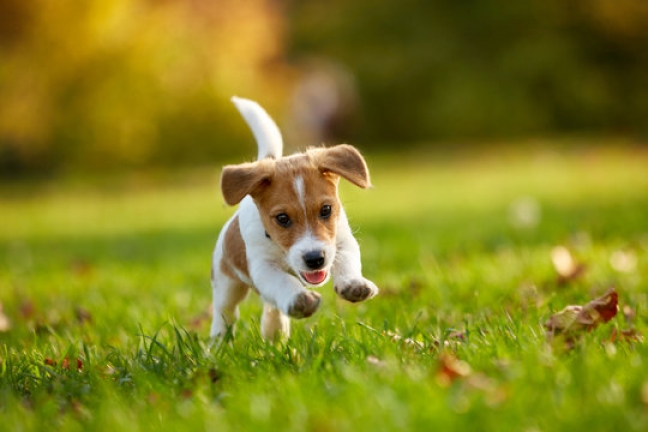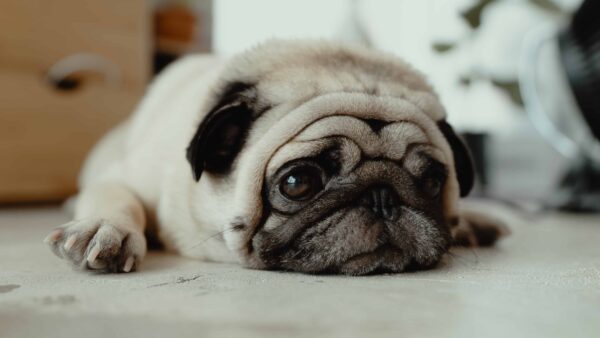Welcoming a new furry friend into the family is always coupled with joy and feelings of excitement. However, taking care of this little new fur ball is unarguably tedious.
It takes a lot of effort to take care of our pets, and one of the major things that makes you a responsible pet owner is the ability to easily detect that your furry friend is sick and also take care of your pet during this period of hiccups.
“My puppy has diarrhea but he is still playful – Should I be worried?” This is the question you are asking yourself after you’ve detected that your dog is currently passing loose and watery stool. However, this condition still doesn’t stop him from playing.
Well, there is nothing to worry about if your puppy with diarrhea still plays around. It is not uncommon seeing puppies with diarrhea play around because puppies are resilient creatures, and they have an unstoppable zest for life. So, even if their tummy is feeling off, it won’t stop them from playing.
It is worth noting that diarrhea may also be mild or severe. In the case of severe diarrhea, your puppy may not be able to play around.
In this article, we have revealed all the reasons why your puppy with diarrhea is playing around. You will also get to know the causes and how to prevent diarrhea in puppies. To make this article more enlightening, we have also disclosed the symptoms of severe diarrhea in puppies and when you should take your dog to see a vet.
Without further ado, let’s dive in!
What Is Diarrhea in Puppy
Diarrhea in puppies refers to the passing of loose, watery stools more frequently than usual. It is a very common condition in puppies, and it doesn’t always indicate a severe health issue.
Puppies are very vulnerable; their immune system is still developing, and their stomach is very sensitive. Ordinary changes in diet or nibbling on substances can easily make them develop diarrhea.
A lot of factors can contribute to diarrhea in puppies. It may be due to diet changes, stress, or even exploring new environments. While these factors listed only cause mild diarrhea in puppies, factors such as viral or bacterial infection and parasites can lead to severe diarrhea in puppies.
My Puppy Has Diarrhea but He Is Still Playful – Should I Be Worried?

It is normal if your puppy with diarrhea is playing around. This is simply because the diarrhea is mild, and it is probably caused by a sudden change in diet or maybe because your puppy nibbles on something he should not have eaten.
Mild diarrhea in puppies will go by itself after a few days even without medication.
Puppies are also very energetic; they might see playing as a solution to their mild diarrhea.
However, it is worth noting that not all diarrhea is mild and in the case of severe diarrhea, your dog may not be able to play around.
Severe diarrhea also requires urgent attention because it may be fatal if not treated on time.
Here are some of the symptoms of severe diarrhea in puppies:
- Bloody diarrhea
- Abdominal pain
- Lethargy
- Vomiting
- Bloating
- Feverish condition
If your puppy has diarrhea and he is also showing any of these symptoms above, kindly consult with your vet immediately for treatment. You should also consult with a vet if the diarrhea lasts for more than two days.
What Are the Common Causes of Diarrhea in Puppies
1. Change in Diet
Puppies have a very sensitive stomach and a sudden change in their diet can lead to diarrhea.
Switching from one brand of puppy food to another too quickly or offering human food as treats without proper transition can upset their delicate stomachs.
However, diarrhea caused by diet change is acute and it will go away by itself after a few days. You can also prevent this from happening by introducing new foods to your dog gradually.
You can start by mixing a little quantity of the new food with his normal food. Keep increasing the quantity of the new food daily until your dog can now eat only the new food without developing stomach upset.
While incorporating new food into your dog’s diet, be very observant and check out for behavioral changes. If you notice any negative symptoms such as stooling, lethargy, vomiting, etc. It is advisable to stop the new food for your dog.
2. Overeating
It is important to feed your puppy according to his size. Overfeeding your pups will overwork his digestive system and this may lead to diarrhea.
Your puppy can still play around if his diarrhea is caused by overeating because the diarrhea is acute, and it doesn’t pave the way for any complicated health issue.
3. Stress or Anxiety
Just as it is in humans, stress, and anxiety can have a direct impact on your dog’s digestive system.
Stressors such as environmental changes, thunderstrike or loud noises and separation anxiety may make your dog feel overwhelmed and anxious.
However, it is important to note that this diarrhea is acute, and it may be resolved by removing the stress factors and comforting your dog.
4. Heatstroke
Heatstroke can cause diarrhea in puppies because it puts a lot of stress on their bodies, including their stomachs.
When the environmental temperature is too hot, your pups will also get hot and their body will try to regulate their temperature by sending more blood to the skin. This will lead to lesser blood flowing into the gastrointestinal tract for digestion.
This can make the stomach irritated and inflamed, leading to diarrhea. Heatstroke also causes dehydration, which can make diarrhea worse. To prevent heatstroke, keep your puppy cool and make sure they have plenty of water.
If your puppy does get heatstroke, take them to the vet right away.
5. Viral or Bacterial Infection
Viral or bacterial infection can cause severe diarrhea in puppies.
One of the most common infections that usually cause severe diarrhea in dogs is Parvovirus also known as Parvo.
Parvo is highly contagious, and it is very common in unvaccinated puppies. This disease is often fatal, and it requires urgent diagnosis and treatment.
If your puppy’s diarrhea is caused by viral or bacterial infection, it will probably need to be hospitalized for IV fluids to maintain hydration, medication, and constant monitoring by the veterinary staff.
6. Parasites
Another factor that can cause diarrhea in dogs is parasites. Parasites such as roundworms, hookworms, whipworms, tapeworms, and giardia can easily infest puppies.
Puppies are curious and they interfere with anything around them. They may sniff contaminated substances such as poo that contains worms. While doing this, they may unknowingly sniff or inhale parasites.
Roundworms may also be transmitted to puppies from their mother during pregnancy or even breastfeeding.
These parasites can cause irritation or inflammation in your puppy’s stomach and this in turn leads to severe diarrhea.
To prevent this from happening, it is important to consult with your vet beforehand, he will place your dog on a deworming schedule.
By implementing preventive measures, such as deworming, you can effectively manage and reduce the occurrence of parasitic infections, minimizing the chances of diarrhea and associated health problems.
How to Prevent Diarrhea in Puppies

We all know this popular saying “Prevention is better than cure”. Although you can’t completely prevent your dog from having diarrhea you can reduce the chances of your puppy experiencing diarrhea by considering the following preventive measures:
Introduce New Food into Your Dog’s Diet Gradually
When switching your puppy’s food, do it gradually over several days. This allows their digestive system to adjust and reduces the risk of upset stomach or diarrhea.
You should also look out for behavioral changes after feeding your dog the new food because he might be allergic to some of the ingredients in the new food.
Supervise Your Puppy and Ensure They Don’t Nibble on Toxic Substances
Puppies are curious and they may nibble on anything around them. However, by supervising them, you will ensure that they don’t nibble on toxic substances that may cause gastrointestinal issues or diarrhea.
Maintain Proper Hygiene by Disinfecting your Dog’s Environment
Maintain good hygiene practices, such as washing your hands before and after handling your puppy, cleaning their living area regularly with pet-safe disinfectant, and also ensure that their food and water bowl are clean.
You should also pick up after them and ensure they don’t come in contact with fecal matter which may contain parasites.
Vaccinate your Puppy
Puppies are vulnerable and they are prone to being infected by diseases. However, by vaccinating them, you can help protect them against infectious diseases.
Until your puppy is fully vaccinated, do not take him to public places or boarding facilities where he can interact with other dogs.
Introducing your unvaccinated dogs to public places will expose them to contracting numerous diseases which may lead to diarrhea.
Regular Veterinary Check-ups
Take your puppy to the veterinarian for regular check-ups. Vaccinations, deworming, and preventive medications can help safeguard against common infections and parasites.
How to Treat Your Puppy’s Diarrhea at Home
Mild diarrhea can easily be treated at home by pet owners. If your Puppy has diarrhea but he is still playful, and you are willing to treat him at home. Here are some tips for you:
1. Feed Your Pups with Bland Foods & Fiber-Rich Foods.
Feed your dog with only bland food such as plain boiled white rice and maybe a boiled white chicken. These foods are bland and very easy to digest, feeding them to your dog will help reduce the rate at which your dog’s digestive system processes food for digestion.
These foods will help soothe your dog’s stomach while providing nutrients. They will also help clear off your dog’s diarrhea.
You should also consider feeding your dog with foods rich in fiber, for example, pumpkin, sweet potato, brussels sprouts, and some other supplements. These foods will help your dog regain his stool consistency by minimizing water loss and also regulating the movement of undigested food in the bowel.
2. Make Use of Probiotics
Probiotics can help get rid of harmful bacteria while also providing necessary bacteria needed in the gastrointestinal tract for digestion.
Probiotics promote a healthy balance of gut bacteria and aid in digestive health. Some of the healthy sources of probiotics for puppies are Yoghurt and Yakult.
You can easily add a spoon of Yoghurt or Yakult to your dog’s diet. They will help soothe your dog’s stomach and also help relieve his diarrhea.
3. Ensure Your Pups Stay Hydrated
Frequent passing of loose stools will make your dog lose a lot of water and essential electrolytes and this will lead to dehydration.
Dehydration in puppies may be fatal if not addressed adequately. If your puppy has diarrhea but he is still playful, make sure he has access to fresh water at all times because he is prone to dehydration.
In severe cases, your veterinarian may recommend electrolyte solutions to restore your pup’s hydration.
4. Reduce the Quantity of Food You Serve Your Puppy Daily
To help your dog having diarrhea but still playful, break his larger food portion into smaller portions and serve at different times.
By doing this, the digestive tract won’t be overworked, and it will be able to process food digestion properly.
When Should You Visit a Vet?

If after trying to treat your puppy at home, the diarrhea persists. This might be an indicator that your furry friend needs to see a vet.
If you notice any of these signs indicating severe diarrhea. Consult with a vet immediately for treatment:
- Your puppy’s stool contains blood
- Your puppy stool is very black and tarry
- Your puppy is vomiting and feeling lethargic while having diarrhea
- Your puppy is refusing to eat due to a lack of appetite
- Your puppy has a pale gum
- You notice a sign of abdominal distress or pain
These signs listed above may be an indicator that an underlying health condition is responsible for your dog’s severe diarrhea and to be on the safer side, your dog needs to be treated by a vet urgently.
Conclusion
Why Does My Puppy Have Diarrhea but he is still playful? The answer to this is very simple. Mild diarrhea won’t make your dog lose his playing spirit!
However, because your dog is acting normal doesn’t mean he is okay and doesn’t need to be treated.
You can assist your dog resolve his tummy troubles by doing things such as serving him bland foods, breaking his food into smaller portions, giving him probiotics, and also keeping him hydrated.
Diarrhea may also be severe and will need you to consult with a vet for treatment.
So, embrace your puppy’s resilience and let him enjoy his playtime while you figure out how you can help resolve his diarrhea.
Frequently Asked Questions on Why My Puppy Has Diarrhea but Still Playful?
How Long Does Diarrhea Last in Puppies?
If your puppy has diarrhea but he is still playful, you don’t need to panic because this diarrhea might be mild and after a few minutes or a day, it should go by itself.
You can also provide probiotics, fiber-rich food, and enough water for your dog to help hasten his recovery.
If your puppy’s diarrhea lasts for more than 48 hours, becomes severe, and is accompanied by symptoms such as vomiting, blood stool, and lethargy, it is best to consult with your vet immediately for treatment.
Prolonged diarrhea will cause dehydration and also make your puppy lose essential nutrients, so it’s best to not delay seeking professional help.
Can Stress Cause Diarrhea in Puppies?
Yes, stress and anxiety can contribute to gastrointestinal upset and diarrhea in puppies. If your dog’s diarrhea is caused by a particular stressor, try to help them remove the stress factor. By doing this, your puppy’s tummy trouble should be resolved.
How Can I Prevent My Puppy from Getting Parasites That Cause Diarrhea?
Puppies often have a burst of energy, and they are very curious to examine anything around them whether good or bad.
If your puppy comes in contact with an object or poop infested with parasites. He may mistakenly inhale or ingest them.
To prevent this from happening, pick after your puppy, keep his living area clean, avoid contact with potentially infected animals, practice regular deworming, and consult your veterinarian for preventive medications.
Before you go, you can also read: Is Bronchitis Contagious in Dogs?







Leave a comment